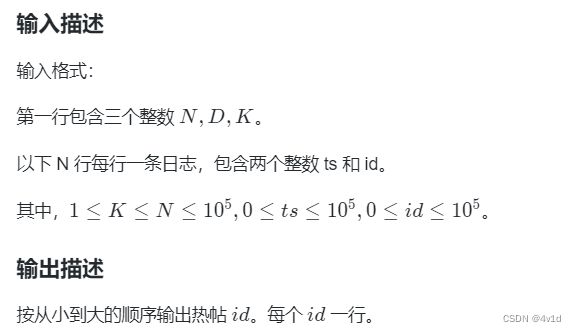2018年蓝桥杯省赛试题-5道(Python)
文章目录
- 一、日志统计
-
- 思考
- 二、递增三元组
-
- 思考
- 三、螺旋折线
-
- 思考
- 四、乘积最大
-
- 思考
- 五、全球变暖
-
- 思考
- 尾声
提示:以下是本篇文章正文内容,下面案例可供参考
一、日志统计
题目描述
小明维护着一个程序员论坛。
现在他收集了一份"点赞"日志,日志共有 N 行。其中每一行的格式是:
ts id
表示在 ts 时刻编号 id 的帖子收到一个"赞"。
现在小明想统计有哪些帖子曾经是"热帖"。
如果一个帖子曾在任意一个长度为 D 的时间段内收到不少于 K 个赞,
小明就认为这个帖子曾是"热帖"。
具体来说,如果存在某个时刻 T 满足该帖在
[T,T+D) 这段时间内**(注意是左闭右开区间)**收到不少于 K 个赞,该帖就曾是"热帖"。
给定日志,请你帮助小明统计出所有曾是"热帖"的帖子编号。


思考
以python角度来处理问题
首先输入的话,input接受参数,外套map来接受多个参数,并指定为int型
N, D, K = list(map(int, input().split()))
然后通过传入的n确定循环次数,将帖子时间和id用列表存储
whole = []
for i in range(N):
whole.append(list(map(int, input().split())))
接着使用defaultdict来将键-值对序列转换为列表字典
collections.defaultdict()的使用
d = collections.defaultdict(list)
for i in whole:
d[i[1]].append(i[0])
Python中通过Key访问字典,当Key不存在时,会引发‘KeyError’异常。为了避免这种情况的发生,可以使用collections类中的defaultdict()方法来为字典提供默认值。
解读以下代码
for key, value in d.items():
if len(value) < K:
continue
temp = []
value.sort()
for i in value:
temp.append(i)
while i - temp[0] >= D:
temp.pop(0)
if len(temp) >= K:
result.append(key)
break
先进行if判断,如果出现的时间点个数都少于所需赞的个数,那后续更难满足其条件了
if len(value) < K:
continue
之后的代码逻辑我是这样理解的
遍历循环时,temp存储临时的ts
while判断i和临时ts之间的差值是否大于题目时间要求,超过则pop出栈顶元素,也就是第一个元素
for i in value:
temp.append(i)
while i - temp[0] >= D:
temp.pop(0)
这样最后的列表temp若存储个数能超过或等于K,说明满足要求
用result列表存储
完整代码
import collections
result = []
N, D, K = list(map(int, input().split()))
whole = []
for i in range(N):
whole.append(list(map(int, input().split())))
d = collections.defaultdict(list)
for i in whole:
d[i[1]].append(i[0])
print(d.items())
for key, value in d.items():
if len(value) < K:
continue
temp = []
value.sort()
for i in value:
temp.append(i)
while i - temp[0] >= D:
temp.pop(0)
if len(temp) >= K:
result.append(key)
break
result.sort()
for i in result:
print(i)
二、递增三元组
思考
import os
import sys
import bisect
# 请在此输入您的代码
N = eval(input())
a = sorted(list(map(int,input().split())))
b = sorted(list(map(int,input().split())))
c = sorted(list(map(int,input().split())))
s = 0
for i in range(N):
n1 = bisect.bisect_left(a,b[i])
n2 = N-bisect.bisect_right(c,b[i])
s+=n1*n2
print(s)
三、螺旋折线
思考
import os
import sys
# 请在此输入您的代码
x,y=map(int,input().split())
n=max(abs(x),abs(y))
if x==-n or y==n:
t=n*(n*4-2)+x+y
elif x==n or y==-n:
t=n*(n*4+2)-x-y
print(t)
四、乘积最大
思考
mo=int(1e9+9)
def mod(x):
if x<0:return -((-x)%mo)
return x%mo
n,k=map(int,input().split())
a=[]
for i in range(n):a.append(int(input()))
a.sort()
l,r=0,n-1
ans=1
sign=1
if k%2:
ans=a[r]
r-=1
k-=1
if ans<0:sign=-1
while k:
x,y=a[l]*a[l+1],a[r]*a[r-1]
if x*sign>=y*sign:
ans*=x
l+=2
else:
ans*=y
r-=2
ans=mod(ans)
k-=2
print(ans)
五、全球变暖
思考
import os
import sys
sys.setrecursionlimit(1000000) # 修改深度限制,否则会出现段错误!!!ex死我了
n = int(input())
highlands = 0
islands = 0
note = [[0] * n for _ in range(n)]
flag = 0 # 确保回溯时重复确认highlands
picture = []
move = [[1, 0], [-1, 0], [0, 1], [0, -1]]
for i in range(n):
picture.append(input())
print(picture)
print(note)
def DFS(x, y):
global flag
global highlands
if note[x][y] == 1:
return
note[x][y] = 1 # 记录已经遍历过
if flag == 0:
if picture[x + 1][y] == '#' and picture[x - 1][y] == '#' and picture[x][y + 1] == '#' and picture[x][y - 1] == '#': # 找到高地
highlands += 1
flag = 1
for i in range(4):
xx = x + move[i][0]
yy = y + move[i][1]
if picture[xx][yy] == '#' and note[xx][yy] == 0:
DFS(xx, yy)
for x in range(n):
for y in range(n):
if picture[x][y] == '#' and note[x][y] == 0:
print(x,y)
islands += 1
flag = 0
DFS(x, y)
print(islands - highlands)
尾声
其他的后续再跟进思路,感觉题目都好难救命
